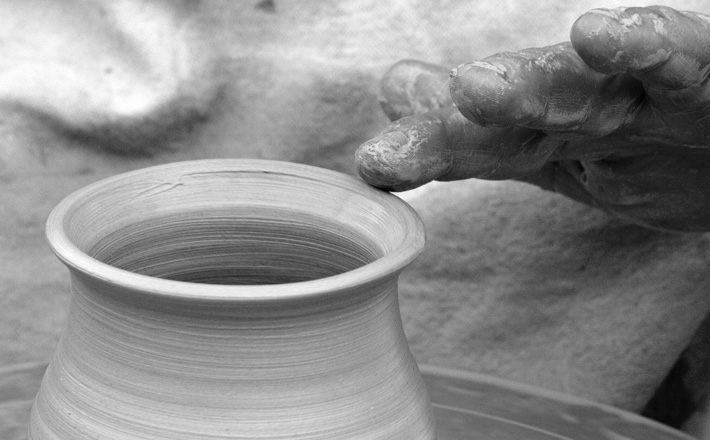Commentary on Jeremiah 18:1-11
In this week’s Old Testament lection, God invites Jeremiah to enter a potter’s shed and there observe the potter working with clay, so that Jeremiah may better hear God’s words (Jeremiah 18:1), understand God’s way with Israel (18:6), and summon God’s people to conversion (18:11).
Jeremiah must leave his own familiar spaces, step away from the scriptures and the sanctuaries, bypass the committee meetings and professional development seminars, and instead learn about God and God’s people by watching an artist at work.
You too, preacher, must visit the potter’s shed. Or watch the painter mix her paints and fill her canvas in the open air. Feel the weaver’s coarse-spun wool as she weaves her tapestry of richly colored threads. Smell the shavings in the woodworker’s garage as she shapes and matches the joints that will secure board to board. Hear the songwriter test chord progressions and lyrical phrases as she scribbles, strums, and hums. When you do, you will learn something new about God and you will hear a fresh summons for God’s people.
Other scriptures invite us to imagine God as ruler and judge, writer and teacher, farmer and builder, father, mother, and lover. Jeremiah 18 invites us to see God as an artisan and artist. The image is not new in the scriptures. Genesis 1 portrays God as the first poet, designer, metalworker, and landscaper, as God speaks, divides, fashions, and populates the cosmos. In Genesis 2:7 God first shapes clay, sculpting and forming humankind from the sediment of the earth. As God’s hands knead and smooth the moist dirt, God breathes life into God’s new creation, so that the human being is simultaneously grounded by this connection to earth and animated by the very breath of God.
Clay that has not been fired
Now, in Jeremiah 18, we hear that God did not simply shape us once for all. To this day, God tells Jeremiah, God’s people are like clay that has not yet been fired. As we too go down into the potter’s shed, we may learn the difference between clay that has been fired and clay that has not yet been fired. It is this: clay that has been fired dries, shrinks, and hardens into a permanent structure and shape. It may be decorative, but is often functional, and is most often designed for a single purpose — a brick or tile, bowl or plate, a mug, a vase, a pitcher, a storage jar, a lamp. It is easy to break. Such clay, now dry ceramic, is often lovely and as often useful. It is specialized. It is also rigid and brittle.
Clay that has not been fired is plastic. It may be shaped and reshaped infinitely. It is a material of possibility: moldable, flexible, responsive.
Though God shaped humankind and breathed life into its nostrils, God did not fire the clay from which she made us. No one of us is only a tile, a pitcher, or a lamp. God is able to shape us and reshape us, and God labors tirelessly at the wheel on our behalf. God assesses our character, perceives our strengths and our weaknesses, builds on our strengths, and, when flaws are found in us, works diligently to remedy them.
A responsive God
After Jeremiah’s visit to the potter’s shed, and after God explains to Jeremiah just how God is a potter and just how God’s people are like clay in God’s hand, whom God is able to re-form (Jeremiah 18:6), God changes gears and begins to talk about God’s plans for nations and kingdoms. It almost seems to be a new subject, for now God is not talking about the house of Israel in particular, but rather about any nation at all. God also sets aside the image of a potter and clay, for a moment, and revisits imagery from Jeremiah’s commission in chapter 1: plucking up, pulling down, building, and planting (1:10). This seeming digression stands as a corrective against a possible misinterpretation of the living parable of the potter and the clay.
God’s plans for a nation, a people, or a kingdom, God explains, are not fixed, and they are not determined apart from our own choices (Jeremiah 18:7-10). On one hand, God’s good plan to build up a people may be thwarted by their choice to do what is evil. On the other hand, God may plan to pull down a kingdom that has made itself great on the backs of the oppressed, but if that nation turns from its evil, God may change her mind concerning the destruction God had planned. Just as we, the unfired clay, respond to the potter’s touch, to water, and to the wheel, so God responds to us.
Human freedom and the call to conversion
And so we see that at the heart of this lectionary passage is the complex interaction between God the artist and maker, on one hand, and, on the other, God’s people, who are like clay in God’s hands, but are also so much more. God cannot make us do anything. God cannot make us use our gifts or choose the good. Nor can God effect our conversion or direct our lives and our will to a new path and purpose if we do not also choose them.
We are neither automatons nor closed circuits. The shape of our character and our lives is not fixed. We remain supple. We, as individuals and as communities, may be formed through education and the practice of virtue. We may be deformed through abuse and ambition. We are susceptible to influence, suggestion, temptation, and corruption. We are also resilient, and capable of astonishing goodness and true conversion. Through it all, even in the company of others and even in relationship with God, each of us forms our own intentions and exercises our own free will.
At the conclusion of this lection, God asks Jeremiah — asks, not commands, and even says “please” — to speak to the people of Judah and inhabitants of Jerusalem, to summon them to conversion. God has planned an end for the kingdom of Judah, but even this future is not fixed. Just as the potter returns to the wheel, so God asks the people to return — please — each one, from the evil path they have chosen, and to make their paths and their deeds good (Jeremiah 18:11).


September 4, 2016